|
|
|
Sort Order |
|
|
|
Items / Page
|
|
|
|
|
|
|
| Srl | Item |
| 1 |
ID:
158674
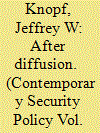

|
|
|
|
|
| Summary/Abstract |
This article discusses six challenges to enforcing norms regarding nuclear weapons. Three challenges reflect generic problems in international politics. These are differences in power, the collective action problem, and trade-offs with other interests. Three additional dilemmas reflect specific characteristics of the nuclear realm. First, membership in international treaties connected to the norms is not universal, raising questions about the appropriateness of enforcement against states that have not signed the treaties. Second, different implications of the norms can come into conflict with each other. In particular, there can be tensions between the requirements of nonproliferation and disarmament norms. Finally, some common options for norm enforcement become quite problematic when dealing with nuclear weapons. For example, if states respond to defections by starting their own nuclear weapons programs, this tit-for-tat response would defeat the purposes of the nonproliferation regime. Despite these challenges, nuclear norms enjoy widespread support and some enforcement is possible.
|
|
|
|
|
|
|
|
|
|
|
|
|
|
|
|
| 2 |
ID:
111130
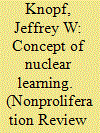

|
|
|
|
|
| Publication |
2012.
|
| Summary/Abstract |
This article seeks to elucidate the concept of nuclear learning. It explores both the "nuclear" and the "learning" aspects of the concept. On the nuclear side, it distinguishes between learning basic facts about nuclear arms and drawing inferences about the larger implications of those facts. On the learning side, it discusses three issues: whether to use the term in a normative or value-neutral manner; the difference between learning that leads to a change in means versus learning that leads to a re-evaluation of ends; and whether learning only takes place at the level of individuals or whether there can also be learning by collective entities. The article argues there is no universal best answer to these questions and that the particular concept of learning that should be employed depends on the goals of the analyst. If the goal is to reduce the chances of nuclear war, however, one type of learning that will be important to consider is whether there is shared, cross-national learning.
|
|
|
|
|
|
|
|
|
|
|
|
|
|
|
|
| 3 |
ID:
095490
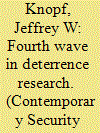

|
|
|
|
|
| Publication |
2010.
|
| Summary/Abstract |
Following the end of the Cold War and accelerating after 9/11, a new wave of research on deterrence has emerged. Building on an earlier characterization by Robert Jervis, this work is here designated the fourth wave. The fourth wave reflects efforts to grapple with the change from a relatively symmetrical situation of mutual deterrence that characterized the Cold War to the asymmetric threats that dominate the current security environment for the United States and many other states. Despite widespread doubts that have been expressed in public about whether the most threatening actors today are deterrable, the fourth wave is nearly unanimous in finding that deterrence remains relevant, even with respect to terrorism. Beyond this basic consensus, the fourth wave also includes vigorous debates, particularly regarding alternative strategies for dealing with WMD-seeking rogue states. Because few analysts expect deterrence to be foolproof, especially in dealing with non-state actors, much of the work has focused on finding ways to improve the prospects for deterrence at the margins. Overall, the most important result of the fourth wave has been to reveal the value of moving toward a broader concept of deterrence that incorporates non-nuclear and even non-military sources of leverage. Proposals to use information and discourse as bases for deterrence are especially innovative and worthy of further research.
|
|
|
|
|
|
|
|
|
|
|
|
|
|
|
|
| 4 |
ID:
117448
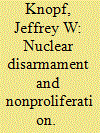

|
|
|
|
|
| Publication |
2012.
|
| Summary/Abstract |
Does the extent or lack of progress toward nuclear disarmament affect the health of the nuclear nonproliferation regime? Commentators have long asserted both positive and negative responses to this question as if the answer were self-evident. Given that opposite positions have been advanced with equal conviction, a more systematic analysis is required. This analysis begins by attempting to identify all of the potential arguments that can be made both for and against the hypothesis of a disarmament-nonproliferation linkage. The arguments are grouped in terms of five broader sets of explanatory factors: security, institutions, norms, domestic politics, and psychology. This approach clarifies the various causal microfoundations that could underpin different arguments in the debate as well as the types of empirical tests that would be most relevant for evaluating the "linkage hypothesis." Comparative assessment of the arguments on both sides suggests that signs of commitment to nuclear disarmament by the nuclear weapon states will tend to enhance support for nonproliferation. Because of the multitude of other factors that affect state decisionmaking, however, progress on disarmament will not by itself address all of the challenges to making the nonproliferation regime effective.
|
|
|
|
|
|
|
|
|
|
|
|
|
|
|
|
| 5 |
ID:
177064
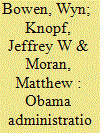

|
|
|
|
|
| Summary/Abstract |
This article examines responses to the Syrian government’s possession and eventual use of chemical weapons (CW) in that country’s civil war from 2012 to 2013. During this time, the United States and other outside powers applied coercive strategies, in both deterrent and compellent modes. Outcomes varied: compellence in the form of coercive diplomacy achieved a partial success, getting Syria to give up much of its chemical stockpile, but there were multiple deterrence failures, culminating in a large-scale sarin gas attack in August 2013. We examine this record to draw lessons about factors associated with the effectiveness of coercion. Our analysis draws on insights from existing research on both deterrence and coercive diplomacy to develop an integrated analytical framework involving the interplay of three factors: credibility, motivations, and assurance. We find the typical default approach to coercion, based on demonstrating toughness and threatening to impose costs using airpower—an approach we call the “resolve plus bombs” formula—was not sufficient to change Syria’s calculations regarding chemical use.
|
|
|
|
|
|
|
|
|
|
|
|
|
|
|
|
| 6 |
ID:
152376
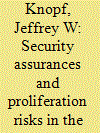

|
|
|
|
|
| Summary/Abstract |
Comments that Donald Trump made while campaigning to be U.S. president have raised concerns that his administration will pull back from U.S. alliance commitments and encourage countries such as Japan and South Korea to acquire nuclear arms. The new article by Frühling and O’Neil outlines an institutional framework that can be helpful in assessing the risks that Trump administration policies will lead to nuclear proliferation. An institutional perspective shows that important elements of U.S. security assurances will continue to function, and this reduces the chances that President Trump’s actions or statements will trigger proliferation by U.S. allies. The greatest risk to global non-proliferation efforts posed by a Trump administration in fact lies elsewhere, in the possibility that President Trump will seek to abrogate the Iran nuclear deal.
|
|
|
|
|
|
|
|
|
|
|
|
|
|
|
|
| 7 |
ID:
035307
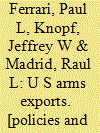

|
|
|
|
|
| Publication |
Washington D.C, Investtor responsibility research centre Inc., 1987.
|
| Description |
xii,342p.
|
| Standard Number |
0931035120
|
|
|
|
|
|
|
|
|
|
|
|
Copies: C:1/I:0,R:0,Q:0
Circulation
| Accession# | Call# | Current Location | Status | Policy | Location |
| 030438 | 383.4506224073/FER 030438 | Main | On Shelf | General | |
|
|
|
|
| 8 |
ID:
113865
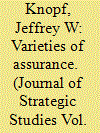

|
|
|
|
|
| Publication |
2012.
|
| Summary/Abstract |
Strategies that seek to assure other states about their security have the potential to reduce international conflict and dissuade states from seeking nuclear weapons. Yet, relative to other tools of statecraft such as deterrence, assurance remains understudied. To facilitate further empirical research on assurance strategies, this article identifies variations in the terminology scholars and policymakers have used to refer to such strategies and describes the concept of assurance associated with each variant. It seeks to clarify and standardize usage and show that there is a general, overarching concept of assurance that links the different variants. It also summarizes existing bodies of empirical research that are relevant to assessing the utility of different forms of assurance.
|
|
|
|
|
|
|
|
|
|
|
|
|
|
|
|
| 9 |
ID:
083625
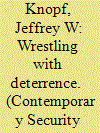

|
|
|
|
|
| Publication |
2008.
|
| Summary/Abstract |
After the announcement of the doctrine of preemption in 2002, many observers concluded the George W. Bush administration had abandoned the strategy of deterrence. This is a misconception. This article aims both to clarify the status of deterrence in American strategy since 9/11 and to assess that strategy.
The Bush administration tried simultaneously to make deterrence do both more and less. Specifically, the administration has sought four goals with respect to deterrence: to bolster American credibility; to stretch deterrence to new tasks; to reduce reliance on deterrence; and implement a new approach of 'tailored deterrence'. Although these different impulses appear to be in conflict, within the administration's strategic outlook they made coherent sense. But the Bush administration underestimated the prospects for deterring rogue states and hence overstated the need for preventive action. Indeed, the Bush administration's rhetorical overemphasis on preemption and regime change may have undermined deterrence. Elements of the American response to international terrorism, moreover, were at cross-purposes with the Bush administration's own efforts to use 'deterrence by denial' against terrorism
|
|
|
|
|
|
|
|
|
|
|
|
|
|
|
|
|
|
|
|
|